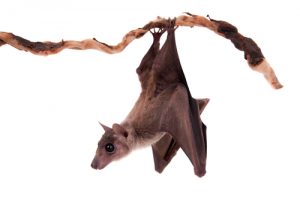Why Bat Removal and Exclusion in MA & NH must be Humane
By Chris Williams on December 28, 2010.
 Since Bram Stoker’s Dracula, bats have played a prominent role in vampire novels and movies, which have led many of us to develop a phobia about these creatures of the night. If we spot the critters outside our houses, we panic. And if they should get inside our homes, our first thought is to remove them permanently by killing them. But killing even one of these critters in New England is illegal. Instead, bat removal and exclusion must be done humanely, without harming them.
Since Bram Stoker’s Dracula, bats have played a prominent role in vampire novels and movies, which have led many of us to develop a phobia about these creatures of the night. If we spot the critters outside our houses, we panic. And if they should get inside our homes, our first thought is to remove them permanently by killing them. But killing even one of these critters in New England is illegal. Instead, bat removal and exclusion must be done humanely, without harming them.
The reason behind human removal and exclusion is because New England lawmakers recognize the many benefits of bats, which most of us are unaware of. Without these flying mammals, our quality of life would decline. Here are just a few reasons how getting rid of bats by killing them would harm us.
Mosquito-Borne Illnesses Would Increase
Getting rid of bats would increase mosquito-borne illnesses such as Eastern equine encephalitis and West Nile Virus. The reason is because many types of bats eat mosquitoes. And some of these critters are quite hardy eaters, too. The small brown bat, for example, can gobble up over 1,200 mosquitoes an hour! And some pregnant females or mothers nursing their pups can consume their entire body weight in mosquitoes in one night alone.
Our Food Supply Would Be Devastated
Permanent bat removal through killing would devastate our food supply. Bats don’t just eat mosquitoes, they eat other kinds of mosquito-sized insects, too, such as ones that destroy food crops. For example, the earworm moth destroys over $1 billion of commercial crops a year. If it weren’t for a huge colony of millions of Mexican free-tailed bats that live in a cave in Central Texas, the crop damage in that area would be even greater than it is because the bats from that cave devour up to 200 tons of insects in a single summer night.
Crops bats protect include:
- Artichokes
- Avocados
- Breadfruit
- Dates
- Figs
- Mangoes
- Peaches
- Watermelons
- Wild bananas
Because bats eat pest insects, farmers use less pesticides on their crops, which helps keep those poisons out of the environment and also increases the farmers’ bottom line.
Plants Wouldn’t Be Pollinated
Some bats pollinate plants, which allows the various species to produce seeds and fruit. So getting rid of bats would mean that the plants that rely on them could die out in some areas. Plants that depend on bats for pollination include:
- Agave
- Avocados
- Balsa wood
- Bananas
- Carob
- Cashews
- Cloves
- Dates
- Durian
- Figs
- Giant cacti
- Mangoes
- Peaches
Devastated Forests Wouldn’t Be Regenerated
Logging, farming, ranching, and fires can devastate forests, turning them into cleared land. Permanent bat removal would mean that some of those devastated forests wouldn’t be regenerated through reseeding. The seeds are in the dung that animals drop. Birds account for some reseeding. But birds fly during the day, and don’t cross wide, open spaces because they fear being attacked by predators such as hawks. So usually they defecate right beneath where they are perching. Fruit bats, though, fly at night across long distances, often defecating in the air along the way. In some areas, bats have reseeded up to 95% of the new first growth on cleared land.
Yet, despite all the benefits of bats, these critters can become pests if they set up housekeeping in your attic or between your walls. Getting rid of bats by evicting them from your home can be frustrating if you do it on your own. Instead, you should turn to a pest control company such as Colonial Pest Control. Their bat removal professionals can get the creatures out of your house humanely, without killing them. Then you can resume enjoying peaceful nights again — along with all the good things these indispensable creatures of the night do for you.